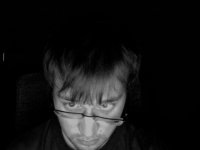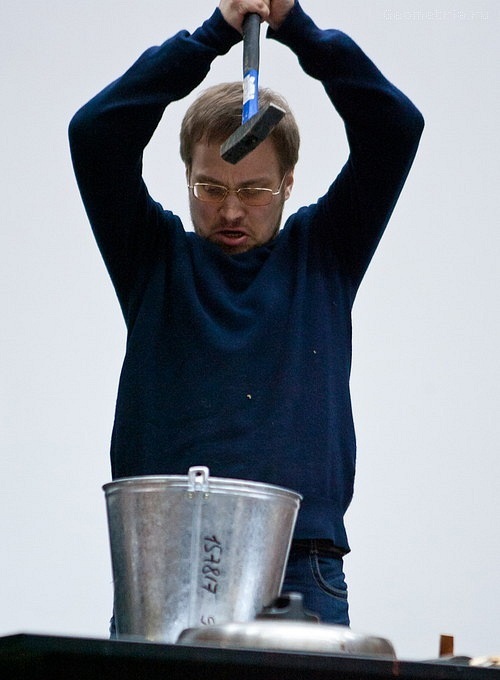
11.04.1984 – 01.02.2013
Born 11.04.1984 in Tomsk in the musicians family. He started his musical education as a violinist and composer at the Edison Denisov Musical College (Tomsk). Graduated from Moscow State P. Tchaikovsky Conservatory after studies with Yury Kasparov, Vladimir Tarnopolsky, Anton Safronov, Sergei Zagniy, Yury Butsko.
He obtained diplomas of the Edison Denisov Young Composers Competition (2007, Tomsk) and Piotr Jurgenson Young Composers Competition (2007, 2009, Moscow). Adagio molto for violoncello and five winds was performed in the final of the competition “Step to the left” (2008, St. Petersburg). Georgy participated in the Fondation Royaumont young composers courses Voix Nouvelles (2009, with Brian Ferneyhough, Isabel Mundry, Misato Moshizouki), Domaine Forget (2011, with Julian Anderson, John Rea, Denis Bouillane), Nuova Consonanza (2011, 2012, with Philippe Manouri, Marc Andre). Attended master classes of Krszystof Meyer (2007), Alain Gaussin (2008), Martijn Padding (2009) and others.
In 2008 Georgy Dorokhov wrote Russian poor (or Russia Povera, the second title — Industrial Zone) for voice and persussion ensemble, performed on the opening of the contemporary art gallery in Perm.
During conservatory years he became closer with a group of enthusiasts of new music ideas (Structural Resistance Group). At the same time he co-operated with the artists of the “left direction”, wrote music and participated in art and political actions with otheryoung artists and musicians (Rondo, 2010; Burn, 2010; Exposition XI for four and more performers with hammers on a cable-bridge, 2012).
Georgy's compositions were performed at contemporary music festivals in Russia, Belarus, Ukraine, Lithuania, Austria,Australia, Argentina, Belgium, Canada, France, Germany, Great Britain, Hungary, The Netherlands, Serbia, Slovakia, Turkey, Switzerland. His works have been performed by Natalia Pshenitschnikova, Stanislav Malyshev, Samuel Stoll, Alexei Shmurak, Ruud Roelofsen, Mark Pekarsky Ensemble of Percussion Instruments, Nouvel Ensemble Moderne , Ensemble Linea, Ensemble Offspring, Moscow Contemporary Music Ensemble, New Music Studio (Moscow), eNsemble (St.Petersbourg), ensemble Nostri Temporis (Kiev), Orkest de Ereprijs, Ancient Music Academy under direction of Tatyana Grindenko, Slovak Radio Symphony Orchestra, ensemble Interface (Germany), Wapiti Ensemble (Canada), No Hay Banda (Canada), United Berlin Ensemble (Germany), Black Pages Orchestra (Austria), Neue Vocalsolisten (Stuttgart) and others.

Conductors: Roman Belyshev, Igor Dronov, Fedor Lednyov, Mark Pekarsky, Oleg Paiberdin, Jean-Philippe Wurtz, Tatiana Senko, Nikolai Sokolov, Lorraine Vaillancourt, Rob Vermeulen, Chungki Min, Vladimir Jurowski, Simone Beneventi, Vladimir Gorlinski.
The basic principles of Dorokhov's compositions were manifested in the unique combination of the outstanding radicalism of the musical language and extended techniques within the frames of the Baroque or classical structures (i.e., sonata, rondo, concerto).
Dorokhov's music is unmistakably recognizable due to the high degree tension between noise and silence, simultaneously combining the perfect self-irony and extremely vulnerable sincerity on the edge of self-destruction.
“This generation has the first hero, extraordinarily gifted composer Georgy Dorokhov, who had largely manifested the search of his peers. His works were based on the idiomas of the 1960s actionist movements (in particular, 'Fluxus'), but Dorokhov gave to this impetuousgestures, often introduced as metaquotation, specific musical content, devoid of spontaneity inherent to the original source. Composer had passed the actionism experience through deeply personal perception, and the provocative gesture turned out to be completely Beethoven's 'vom Herzen'. This straightness of subjective discourse of the young composer showed himself to be the heir to Tchaikovsky, Shostakovich and Schnittke. This subjectivity and aspiration into his own emotional impulses, but outwardly manifested in the change of the control form over the time / space of action, all the more compounded from work to work, and who knows what would have been the evolution of the style of Georgy Dorokhov: his artistic career was interrupted on 28th year of life. Works left by him may serve as a measure of the radicalism of his generation representatives”. (F. Sofronov. "Russian Music for 20 years").



